When it comes to water chemistry, one of the biggest questions we hear is, “Why does my pool keep getting algae?” It’s a fair question. However, before we dive into the deep end with water chemistry, we first need to talk about what algae are, how it forms, and how you can combat and even prevent it.
What Exactly Are Pool Algae?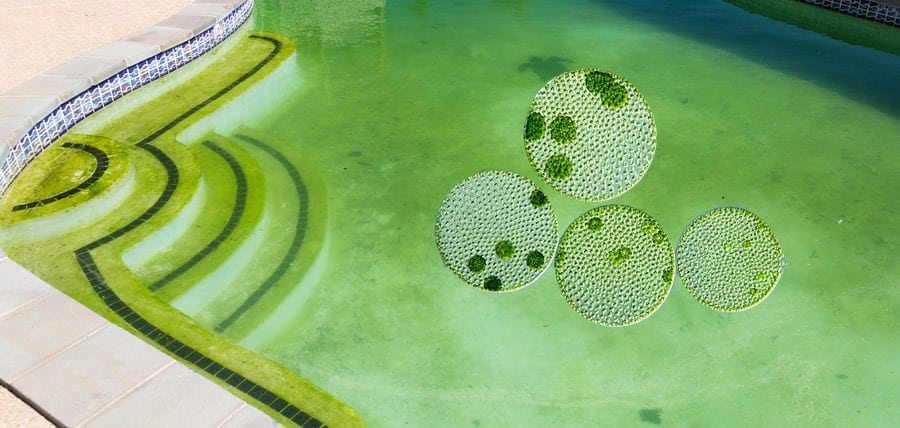
To be honest, there are a few things that contribute to pool algae. But, what exactly are pool algae?
Algal blooms are actually just living plant organisms that can inhabit your pool and multiply quickly. Algal blooms use photosynthesis to create their own food. You can find algal blooms in a variety of colors and forms and they are microscopic in size. This means that there could be millions of algal blooms in your pool before you even realize it.
However, unlike the algal blooms you might see in marine water, most pool algal blooms are seemingly harmless to swimmers. Still, that doesn’t mean you want it there or swim in it. In fact, you don’t just want to fight algal blooms, you want to prevent them.
What Causes Pool Algae?
There are many different reasons that can contribute to algae in your pool. To be fair, algae don’t just occur in unhealthy pools. So, if you’re fighting algae right now, don’t be too hard on yourself.
Algae can occur because of many reasons including:
- Unbalanced chemicals
- Hot weather
- Undersized filter
- Undersized pump
- Circulation issues
- pH imbalance
- Dirt, debris, and leaves in the pool
In short, if you own a pool, it’s inevitable that you will see algae at some point.

Why Does My Pool Keep Getting Algae?
Okay, you already know what algae are and you know how it forms, but you’re still wondering why does my pool keep getting algae. To determine the “why” you will have to play the process of elimination. Ask yourself the following questions:
Are my pump and filter the correct size?
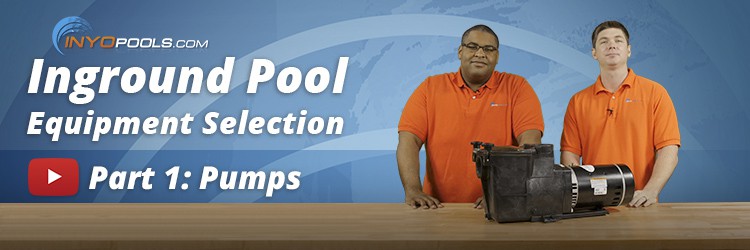
It’s important to ensure that your pump and filter are large enough to handle the gallon size of your pool. Are you running your pump long enough? Remember, the rule of thumb is you want to turn over or filter your entire pool within an eight-hour period.
Is my pool equipment in proper working condition?
Sure, you’re running your equipment as normal, but is it running properly? It is crucial to ensure that your pump and filter (and cleaner) are in working condition. For example, if you haven’t backwashed, cleaned, or replaced your filter grids, your pool won’t filter properly. Eventually, you will see algal blooms in your pool if you do not address the issue.
Remember, on your quest to rid algae, the type and the size of your filter play a huge role. Larger filters allow pool owners to go longer periods of time between cleaning. This is especially useful when ridding algae. D.E filters are the best for filtering smaller particles. As a result, it is the best filter to rid your algae.
- How To Backwash a Sand Filter
- How To Backwash a D. E. Filter
- How To Clean Your Cartridge Filter
- How To Clean Your D. E. Filter
Are my pool chemicals in balance?
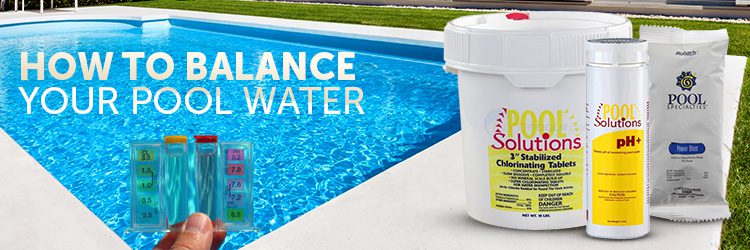
Honestly, pool chemistry is not for the faint-hearted. It may take some trial and error, however, pool chemistry is crucial to the overall health of your pool. So, even if you have a pool technician taking care of your pool, it might be beneficial to write down tips and pointers.
When in doubt, test your water. You can purchase your own testing kit or take a water sample to your local pool store for testing. Once you get your water analysis, you can begin to balance as necessary.
Does my pool need shocking?
In some cases, you will have to shock your pool because simply rebalancing your pool isn’t enough. Shocking your pool, or super chlorinating, is a cleaning method that keeps your pool water clean and safe by adding three to five times the normal amount of chlorine.
The large dose breaks down the combined chlorine, organic waste, and other contaminants in your pool. Additionally, it re-establishes a positive level of free chlorine. This process is not instant and can take several days to conquer.
How Often Should I Shock My Pool?
Am I having circulation issues?
Pool circulation problems oftentimes result in low flow. Low water flow in your pool can affect the performance of your pump and filter. Thus, leading to algae. If you are experiencing circulation issues because of low water flow, there are a few areas around the pool that you can check yourself.
Is my swimming pool clean?
We are not referring to chemical balance when we ask if your pool is clean. We are referring to objects in your pool that you can literally see. Branches, leaves, pollen, dirt, bugs, animal droppings, and random debris all contribute to algal growth. Unnecessary debris mixed with hot weather is a recipe for algae.
When did you scrub your pool walls last? If you honestly can’t remember, then it’s probably time. If you have a pool maintenance person, ask them. Algal blooms have a bad habit of sticking to your pool wall. Brushing your pool walls regularly helps ensure those blooms aren’t forming consistently.
How Much Algae Is Too Much?
In some cases, it’s simply easier to drain your pool and start over than clean the pool. Also, depending on if you have time restraints, this may be a quicker option than cleaning the pool.
If you are having issues trying to rid your pool of algae and can’t find a solution, contact us on our website via our chat system. We have qualified technicians available Monday to Friday.

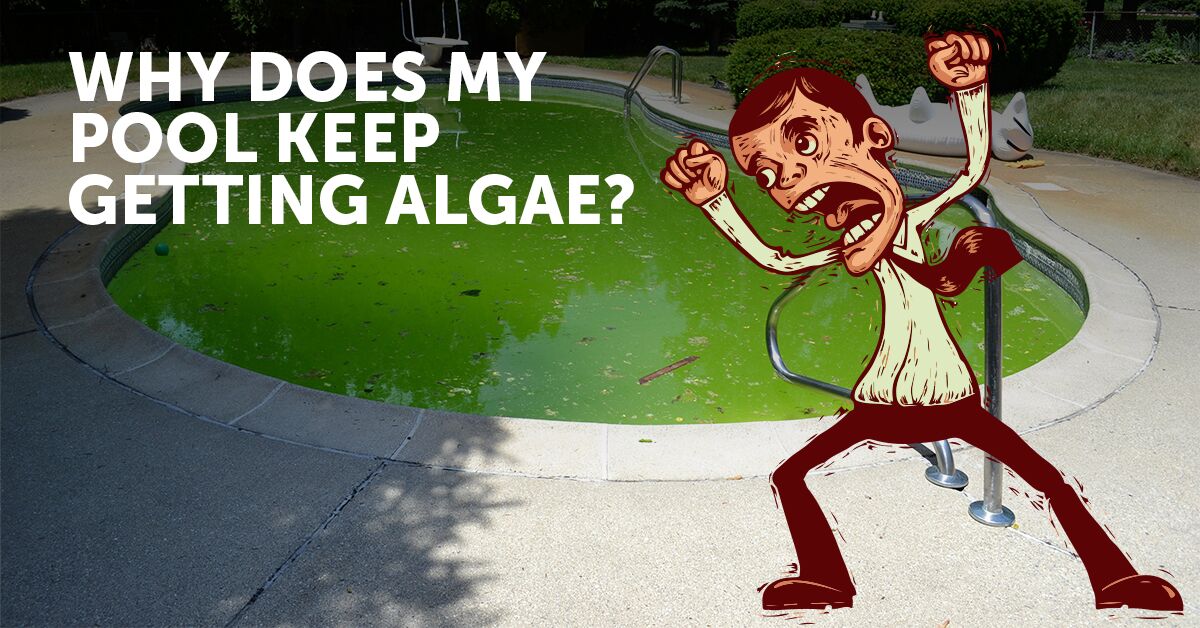
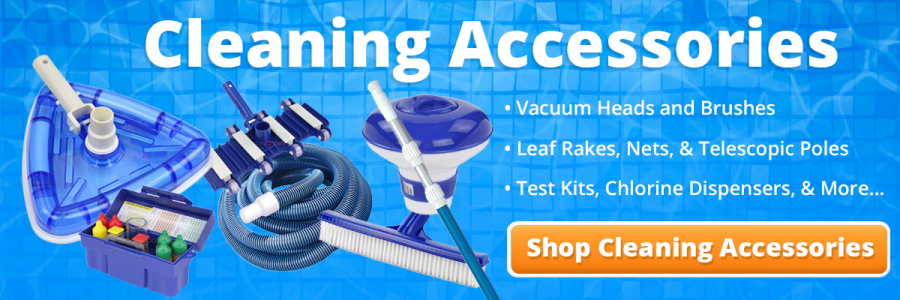
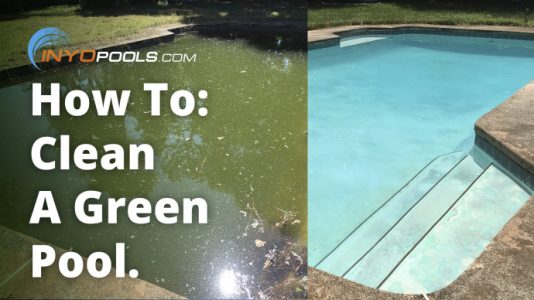
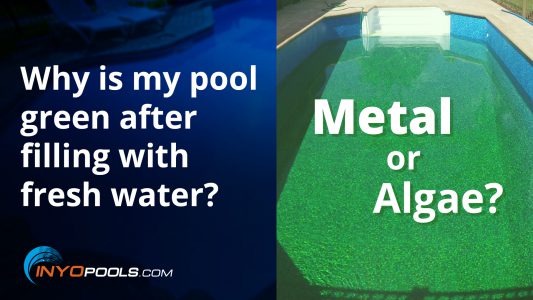
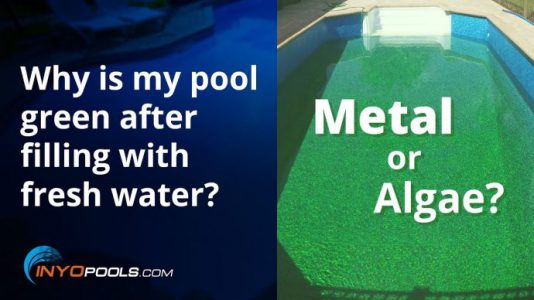






I’m having a constant problem with algae forming at the bottom of the pool when the pool pump is on. After I vacuum the algae to waste line and leave pump off during the day, I notice algae does not form and sit at the bottom of the pool. Before bed I turn pump on letting it run for 8 hours and wake up to the pool floor with streaks and clumps of algae. I just finished slamming pool, but still having issue. FC is 9.5, PH is 7.8, TA is 70, CH is 180, and CYA is 50. Please help!!
Your TA is too low; it should be 80-120 ppm.
An algae bloom would not be able to happen in pool water with an FC that high. I’d get the water tested at a pool store to confirm these results. Also, you need to run the pump longer and ensure proper circulation in the pool. If the pool is constantly on the edge of turning green, extra steps need to be taken to knock it back into shape.
I’d also look into how you are chlorinating the pool, something is not up to par.
Here you will get to know about why does my pool keep getting algae. This article is very informative and helpful for everyone. Before hitting on the other blogs I would request all to give a try here to get the best available content here. The article is much informative regarding work as well. I have seen similar information at one place, you can also see on Poolpac.co.nz
Hi
I’ve been struggling with algae all last summer. I have an above ground 10,000 pool. In the end of the season I shocked the pool, vacuumed it to waste and closed it. This year when I opened the pool water was a bit cloudy but clear. I balanced PH and Alkalinity and shocked the pool (2lb for 10k gallons). The next day I brushed and vacuumed and at night added another 1lb of sock. The next day I see light grey substance on the bottom that looks like what I vacuumed to waist in the end of last year after killing algae. The substance is light gray color and decimates when touched. What could it be. Please help I am at a complete loss and desperate. I wish I could post pictures.
Thank you so much.
It is possibly dead algae. I would drop in some clarifier or flocculant to help the filter capture it or to vacuum it to waste.
Algae needs food and phosphates provide algae with the nourishment needed to survive. You want to use a phosphate remover to lower phosphates down below 250 ppm but lower is better. This should keep your pool algae free while also keeping other chemicals at their proper levels.
Should you always shock after rain? Also, if you brush the sides of the pool, doesn’t that spread the algae?
No, algae anchors itself to pool sides and floor. The idea is to treat first following directions of chemical or pool supply house. Then brush the sides and floor to get the algae into the filter then backwash or clean you filter media to remove the dead algae
You are right on with your article but like someone said earlier…if you remove the food, phosphates, they wont bloom as often or as prolific. I have dealt with algaes and it has always started getting better with chlorine and brushing but if it gets treated and brushed 1 time anweek, it is back when that 1 times come back around. Removing the phosphates minimizes the reoccurrence and helps you conquer the bloom. Yellow and black are different stories.
Do you only add chlorine to your pool once a week? If that is the case, it sounds like you would need to do a booster shot of chlorine midweek to ensure the level stays in an effective range. If you have to scrub the beginnings of algae bloom off your walls every week, you need to change something in your current routine.
You do not need to add shock after every rain. If you check your chlorine after it rains, it is within normal ranges, skip the shock.
Brushing does not spread algae; it breaks it up. Think of it like this, the chlorine is Windex, and a window smudge is the algae. If you spray on the Windex, sure it should clear up the smudge, but there may still be residue left. So, what do we do, get a paper towel to wipe it off. Because algae is more stubborn than dust, we use a brush instead.
I took a Water Sample to the local Pool Store,when I bought some Algycide.They tested the Water and mentioned that it had to much Acid.Solution ,drain your Pool Water and put fresh water in .Bring new water sample to Store.Answer;with the new Water ,I don’t need a test. Question about the Acid. Do I have to much Muriatic Acid in the Water or do I need more ? PH seems to be fine with my Home base test ?
Ok, if your PH is fine then the pool store was referring to cyanuric acid. Its a byproduct of chlorine it’s the double edged sword effect. You want your cyanuric acid level below i believe 50ppm. There are some cyanuric acid removers out on the market I haven’t used them so I can’t attest to their effectiveness but I’ve heard they do work. The removing of water sometimes half or a complete drain and refill removes it also. I use regular liquid bleach it’s chlorine and works great for me.
I’m sorry but I do not understand the part after you drained the pool and added freshwater.
To know if you need more muriatic acid I would need to know what you current levels are now; the same goes for the pH.
I’m fighting mustard algae. I’ve had it since I first had my pool put in five years ago, but I just thought it was little specks of dirt. For three summers I have tried to get rid of it. I’ve already triple shocked my pool 8+ times in the last two weeks. I’ve used 10 lbs of Yellow Out or Yellow Klear. I’m spending so much money triple shocking and it just comes back. I don’t know what to do.
I have a saltwater fiberglass pool approximately 15,000 gallons.
Following, same problem here!
I dont work for Inyopools. Just knowledgeable about pools.
1. First I would treat your water to knock down the algae while making sure chlorine and PH is good.
2. Take water to a pool store have them check your water for phosphates. Algae uses phosphates for food. I believe you want your phosphates lower than 250 ppm. You will want to use a “no phosphate treatment”. No phosphates then your algae should be minimal. follow instructions on chemical bottle and or pool store.
3. What other chlorine do you use when your pump is not running your salt system? Salt system only makes chlorine when your system is running.
I suggest draining the pool and completing an acid or chlorine wash. Mustard algae can be incredibly stubborn, so it is best to start anew than to repeat the cycle. We have a guide on how to do this on this page: How To Drain and Clean A Swimming Pool
Hi,
While I have removed the algae in the water, I am interested in knowing how to remove the black deposits (that look like scrapes) and have taken hold in random spots within pool walls. Is there anything useful to address this issue?
On the algae video, one question I do have is; what exactly should a pool be treated with routinely — besides chlorine. I tend to shock my pool once a week (as instructed to do so) but feel I need to be more precise with how I’m running the maintenance operation. Can you provide some tips in this area as well?
Thanks!
In your discussion about algae you don’t mention phosphates. What about Lanthanum based phosphate removers?
The thing about phosphates is that it is food for algae, but it does not create algae. So as long as your pool is properly dosed with chlorine, the algae can’t bloom to then eat the phosphates present in the water.